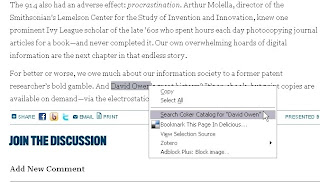
As the library's resident World War II expert, I've read many volumes covering the various aspects of combat during those dark days of the 1930s and 1940s. From veteran's memoirs and in-depth histories of particular operations or battles to broad coverage of the entire conflict, most of these tomes cover the combat and heroics of front line troops. A few might mention the rear echelon soldiers, sailors and airmen, but most look at these troops with derision (with nicknames unprintable here). A few cover these troops well, like David Colley's
The Road to Victory : the Untold Story of World War II's Red Ball Express.Judith A. Bennett's
Natives and Exotics: World War II and Environment in the Southern Pacific is unique because it is one of the first books to cover the great environmental impact of having over 2 million men and women -- Japanese, Dutch, Australian, and American -- invade the hostile environment of the Southern Pacific. Although tales of combat are mentioned, most of the book deals with the rear areas and the troops that provided medical care, supplies, and food to the frontline soldiers and Marines.
Most casual readers of World War II history know that the Pacific theater was a difficult place to wage war, but most probably didn't know how difficult it was just to survive on some of those islands. Incessant rain, disease, poor sanitation practices, and lack of food/diversity of diet were some of the major environmental factors affecting both sides -- and all of that happened before combat even started!
Bennett tells of the infamous fighting on the Kokoda Trail, between Australian (and later U.S.) and Japanese troops. The Japanese military was still unstoppable at this point - the Philippines, Wake Island, Guam, and Singapore had fallen and now Australia itself was threatened. The Japanese military decided to land on the northern coast of New Guinea, near the villages of Buna and Gona. Their objective was to take Port Moresby, on the southern coast, via a "road" through the treacherous Owen Stanley Mountains. Their beachhead was located near malarial swamps, so by the time the Japanese troops met the Australian forces, they were in the throes of malaria. Moving their bivouacs out of these swamps, and using better anti-malarial practices might have had a huge impact on the Japanese troops' performance. The Aussies were using better anti-malarial practices (basically getting rid of mosquito larvae, defoliating, issuing insect repellent, and so on) and thus were able to fight at almost full strength. However, when American forces joined the Australians late in the campaign, they disregarded the successful anti-malarial practices (more than likely, supplies were low of bug repellent and defoliants) and suffered greatly from a large outbreak of malaria, impairing their performance. Not surprisingly, U.S. forces made a habit of disregarding local or Allied expertise in fighting in the environs of the South Pacific.
With every soldier or Marine, food was of utmost importance -- even if only for keeping morale high. Shipping the food across the great expanse of the Pacific Ocean was costly. Refrigeration was in high demand for blood plasma, so food supplies were often canned or dehydrated. Both combatants turned to local gardens and native farming to help give their troops some variety in the mess halls and in the field. For the Japanese on isolated outposts late in the war (after their naval link to the home islands was cut), this local gardening was all they had. Bennett does an excellent job discussing the different types of crops and methods used, as well as incorporating natives and their practices into farming.
Fishing proved to be an important food source for both sides, and they would even use explosives (when they could be spared) to blast the fish to the surface. Australian forces set up fish processing stations using local Melanesian labor and allowing the islanders to design their own workstations. Americans took a different tack. They supplied their support troops with fishing gear designed to work in the cold waters of New England. The tackle was too heavy to use near the coral reefs that permeate the South Pacific, so few fish were caught without modifying the gear. Once fish was caught and ready to be processed, American forces set up elaborate processing stations for local labor to utilize, with tables and benches. The islanders had been fishing for many generations using their own methods. They preferred to clean and process fish sitting on the ground, cross-legged. Needless to say, satisfactory changes were made and the islanders began processing record amounts of fish for hospitals and outposts.
Bennett includes pictures, charts, maps, and ample graphs. The book is heavily footnoted and has a substantial bibliography. Not exactly for the casual history reader, the book is a good read and breaks new ground in an important field of study.
Rating: 

 out of 4 Cobras
out of 4 Cobras
 Library supporters from around the country will join together today, June 29, to express their support for library-friendly funding and policies to the U.S. Congress. The rally will take place on Capitol Hill and will serve as a visual reminder to members of the U.S. Congress that libraries still matter. Tell our South Carolina legislators today how important libraries are to our communities and schools. Your voice makes a difference. Our voices together can make a big difference. For more information click here.
Library supporters from around the country will join together today, June 29, to express their support for library-friendly funding and policies to the U.S. Congress. The rally will take place on Capitol Hill and will serve as a visual reminder to members of the U.S. Congress that libraries still matter. Tell our South Carolina legislators today how important libraries are to our communities and schools. Your voice makes a difference. Our voices together can make a big difference. For more information click here.













